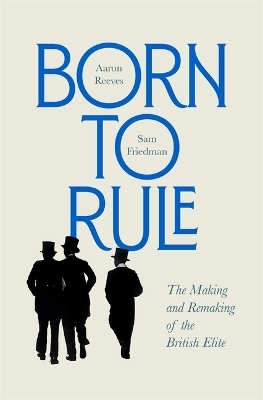
Born to Rule
The Making and Remaking of the British Elite
Seiten
2024
Harvard University Press (Verlag)
978-0-674-25771-9 (ISBN)
Harvard University Press (Verlag)
978-0-674-25771-9 (ISBN)
This data-rich sociological study uses everything from census figures to Who’s Who to analyze how, over 125 years, the British elite have used status, elite education, and powerful social networks to shape politics and cultural values. But what happens when elites begin to change—in what they look like, value, and how they position themselves?
A uniquely data-rich analysis of the British elite from the Victorian era to today: who gets in, how they get there, what they like and look like, where they go to school, and what politics they perpetuate.
Think of the British elite and familiar caricatures spring to mind. But are today’s power brokers a conservative chumocracy, born to privilege and anointed at Eton and Oxford? Or is a new progressive elite emerging with different values and political instincts?
Aaron Reeves and Sam Friedman combed through a trove of data in search of an answer, scrutinizing the profiles, interests, and careers of over 125,000 members of the British elite from the late 1890s to today. At the heart of this meticulously researched study is the historical database of Who’s Who, but Reeves and Friedman also mined genealogical records, examined probate data, and interviewed over 200 leading figures from a wide range of backgrounds and professions to uncover who runs Britain, how they think, and what they want.
What they found is that there is less movement at the top than we think. Yes, there has been some progress on including women and Black and Asian Brits, but those born into the top 1 percent are just as likely to get into the elite today as they were 125 years ago. What has changed is how elites present themselves. Today’s elite pedal hard to convince us they are perfectly ordinary.
Why should we care? Because the elites we have affect the politics we get. While scholars have long proposed that the family you are born into, and the schools you attend, leave a mark on the exercise of power, the empirical evidence has been thin—until now.
A uniquely data-rich analysis of the British elite from the Victorian era to today: who gets in, how they get there, what they like and look like, where they go to school, and what politics they perpetuate.
Think of the British elite and familiar caricatures spring to mind. But are today’s power brokers a conservative chumocracy, born to privilege and anointed at Eton and Oxford? Or is a new progressive elite emerging with different values and political instincts?
Aaron Reeves and Sam Friedman combed through a trove of data in search of an answer, scrutinizing the profiles, interests, and careers of over 125,000 members of the British elite from the late 1890s to today. At the heart of this meticulously researched study is the historical database of Who’s Who, but Reeves and Friedman also mined genealogical records, examined probate data, and interviewed over 200 leading figures from a wide range of backgrounds and professions to uncover who runs Britain, how they think, and what they want.
What they found is that there is less movement at the top than we think. Yes, there has been some progress on including women and Black and Asian Brits, but those born into the top 1 percent are just as likely to get into the elite today as they were 125 years ago. What has changed is how elites present themselves. Today’s elite pedal hard to convince us they are perfectly ordinary.
Why should we care? Because the elites we have affect the politics we get. While scholars have long proposed that the family you are born into, and the schools you attend, leave a mark on the exercise of power, the empirical evidence has been thin—until now.
Aaron Reeves is Professor of Sociology at the London School of Economics. An award-winning sociologist who has written extensively on social inequality, he is coeditor of the British Journal of Sociology. Sam Friedman is Professor of Sociology at the London School of Economics and Political Science and the coauthor of The Class Ceiling: Why it Pays to be Privileged and author of Comedy and Distinction: The Cultural Currency of a “Good” Sense of Humour. He is coeditor of the British Journal of Sociology.
| Erscheinungsdatum | 21.08.2024 |
|---|---|
| Zusatzinfo | 58 illus., 3 tables |
| Verlagsort | Cambridge, Mass |
| Sprache | englisch |
| Maße | 156 x 235 mm |
| Gewicht | 676 g |
| Themenwelt | Geisteswissenschaften ► Geschichte ► Regional- / Ländergeschichte |
| Geschichte ► Teilgebiete der Geschichte ► Kulturgeschichte | |
| Sozialwissenschaften ► Ethnologie | |
| Sozialwissenschaften ► Politik / Verwaltung ► Staat / Verwaltung | |
| Sozialwissenschaften ► Soziologie ► Makrosoziologie | |
| ISBN-10 | 0-674-25771-5 / 0674257715 |
| ISBN-13 | 978-0-674-25771-9 / 9780674257719 |
| Zustand | Neuware |
| Haben Sie eine Frage zum Produkt? |
Mehr entdecken
aus dem Bereich
aus dem Bereich
der stille Abschied vom bäuerlichen Leben in Deutschland
Buch | Hardcover (2023)
C.H.Beck (Verlag)
23,00 €
vom Mittelalter bis zur Gegenwart
Buch | Softcover (2024)
C.H.Beck (Verlag)
12,00 €
Die Revolution des Gemeinen Mannes
Buch | Softcover (2024)
C.H.Beck (Verlag)
12,00 €


